April 14, 2025 | 08:51 GMT +7
April 14, 2025 | 08:51 GMT +7
Hotline: 0913.378.918
April 14, 2025 | 08:51 GMT +7
Hotline: 0913.378.918
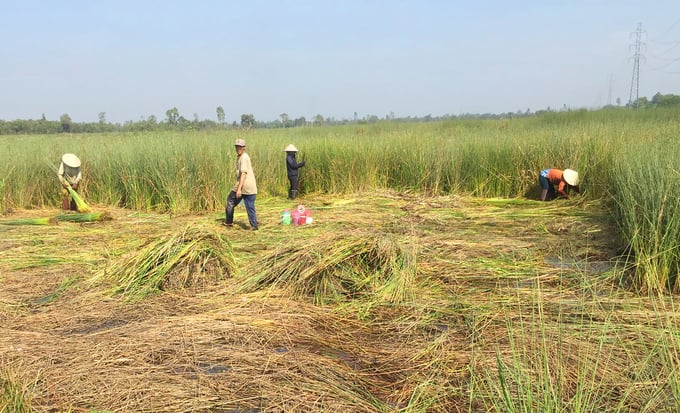
Long An farmers harvesting Lepironia articulata.
With the aim of bringing green, natural and environmentally friendly products to domestic and foreign consumers, Mien Tay Xanh Company in Dong Trung hamlet, Tan Chanh commune, Can Duoc district, Long An province has fully utilized the local indigenous resource of Lepironia articulata to create "trendy" products as well as create jobs and increase income for many local people.
Located in a land endowed with a rich source of raw materials, Mr. Bui Thanh Duoc, owner of Mien Tay Xanh Company, came up with the idea to develop a raw material area of Lepironia articulata - a seemingly under-utilized grass that can be used to create valuable, environmentally friendly products.
In order to establish a stable source of raw materials, Mr. Duoc has established linkage with grass farmers on a total area of 150 hectares and secured their output. “Instead of selling raw materials for export, why don't we take advantage of available resources to make valuable products, optimize benefits, sell to the market, and improve people's livelihood using the local indigenous source of raw materials", Mr. Duoc explained.
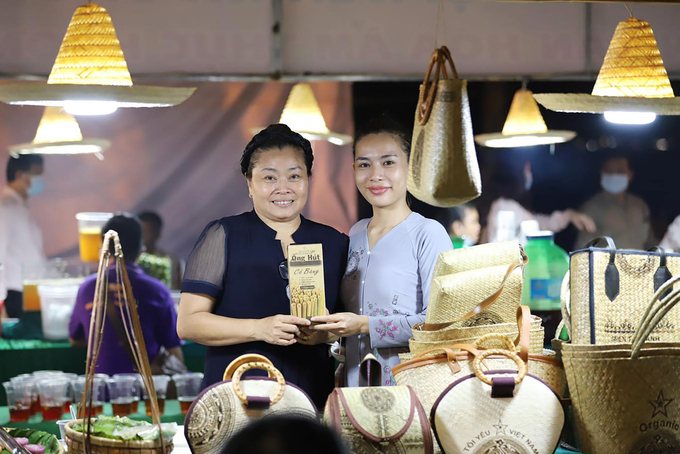
Mien Tay Xanh's products are regularly selected as the key products of Long An province at fairs and exhibitions.
Lepironia articulata is a grass that grows in alum soil so farmers avoid using pesticides and chemical fertilizers. The grass purchased from farmers must ensure compliance with the production process that Mien Tay Xanh requested. The requirements include: the leaves of the grass must be of sufficient age, sufficient length, the diameter of the trunk must be between 5 to 8mm, the grass must not be contaminated with chemical residues or planted in polluted lands. After collection, the grass is soaked in ash water to eliminate bacteria, remove natural alum and subsequently put into production.
In order to improve value as well as optimize costs, Mr. Duoc invested in importing machinery to produce straws with uniform quality.
The straws are made from entirely natural Lepironia articulata, with careful investment in production as well as luxurious and beautifully designed packaging. As a result, the Mien Tay Xanh's grass straws are priced competitively, offering significant differences compared to similar products on the market. Straws made from Lepironia articulata biodegrade in the natural environment within 8 months.
Mr. Duoc said that his grass straws product was recognized as a 3-star OCOP product of Long An province and certified to meet the ISO 22000: 2018, HACCP standards in 2021. His product is currently present in coffee chains, restaurants, hotels nationwide as well as exported to various fastidious markets including the US and Japan.
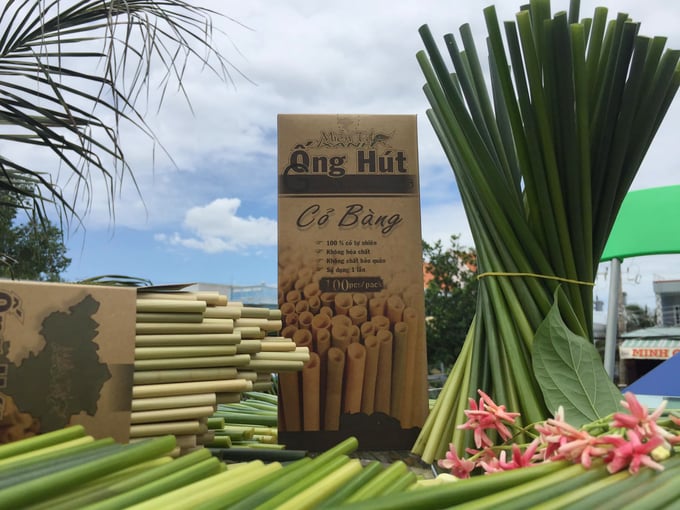
Straws made from Lepironia articulata produced by Mien Tay Xanh Company.
In addition to developing the main product line of grass straws, Mien Tay Xanh also specializes in producing fashion-oriented products including bags, wallets, backpacks, travel hats, etc. with a variety of stylish, trendy, and practical designs, which is made by the skillful, meticulous hands of local craftsmen.
The company currently brings nearly 3 million grass straws and about 5,000 backpacks and bags to the market every month on average. Products are sold on domestic and international e-commerce platforms such as Alibaba, Amazon, Shopee, and Lazada; they have also been exported to international markets such as France, Japan, USA, Germany, Czech Republic, Saudi Arabia, and South Korea. Mr. Duoc's grass straws product has earned the trust of consumers and domestic partners; they are present at restaurants, hotels, convenience store chains, supermarkets in Ho Chi Minh City.
Commenting on the company's orientation for the future, Mr. Duoc said that he wanted to expand the raw material area, establish linkage with more local people and expand the factory to create diverse and environmentally friendly products for domestic consumers and export.
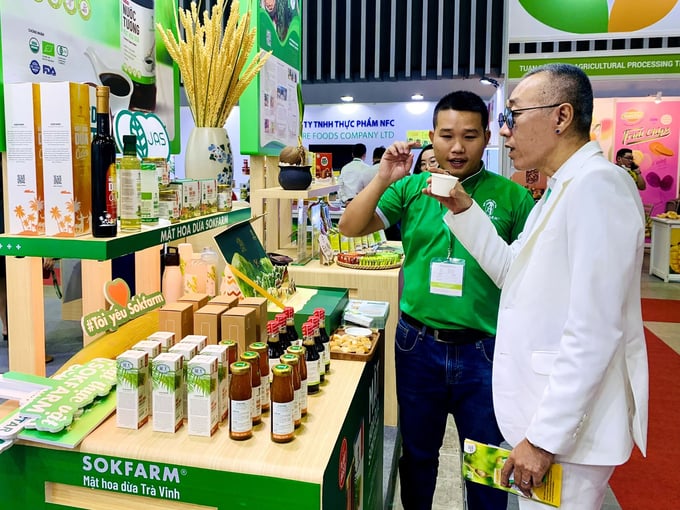
Sokfarm's exhibition booth at Vietnam Foodexpo 2022.
Starting out as a participant in the BSA's Rural Youth Creative Startup Project Contest in 2020, Sokfarm's coconut nectar product by Pham Dinh Ngai and Thach Thi Chal Thi has gradually found a foothold in the market thanks to investment in the organic materials area, safe farming process, ecological and environmental protection, and most notably, applying advanced technology in deep processing with the use of pasteurization machine, sweetening machine, cooling machine, packaging machine following a one-way standard to convert indigenous resources into products that meet green consumer needs.
Mr. Pham Dinh Ngai said that Tra Vinh is a coastal province with saline intrusion in several areas, and the income of coconut farmers in the province has dropped sharply because the yield of coconut is heavily affected by climate change. Consequently, since the early days of its establishment, Sokfarm has converted the areas where coconuts are harvested for fruit into areas where they are also harvested for nectar. This conversion has contributed to increasing farmers' income fivefold.
Coconut nectar has a sweet taste, lower glycemic index compared to honey, cane sugar and high mineral content, making it suitable for people suffering from diabetes, people with high glycemic index, and the elderly. Nectar secreted from coconut flowers can be processed into honey, sugar as well as a variety of other products, helping to increase economic value.
With the aim of promoting the traditional professions of ethnic minorities, and the global trend of sustainable consumption development, climate change, green consumption where priority is given to products made from natural sugar with high mineral oil content, Sokfarm was the only Vietnamese business in 2021 to receive the ASEAN Business Awards for "Inclusive Business". This award is dedicated to businesses implementing circular economy, promoting traditional professions, creating employment opportunities, in line with the global trend of sustainable development, green consumption.
Sokfarm is built and operated according to HACCP standards; their coconut nectar products are ISO 22000 - 2018 certified, and have achieved organic certifications in the US, EU, and Japanese markets.
"I'm a businessman, I see that my hometown has advantages, and I utilize them. When I first started out, I did not immediately orient the Company towards circular economy or inclusive economy”, shared Mr. Pham Dinh Ngai.
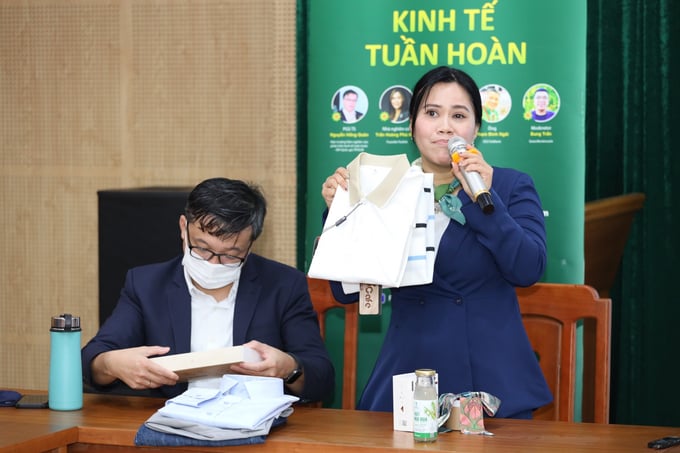
Faslink shirts are made from coffee grounds.
The circular economy is regarded as a tool and an approach towards the goal of sustainable development. Notably, the use of agricultural by-products - a renewable resource to create high-value, environmentally friendly products is being applied effectively by many establishments and businesses.
Ms. Tran Hoang Phu Xuan, Director of Faslink Fashion Connection Joint Stock Company, said that Faslink introduced the circular economy development model 6 years ago and has benefited greatly from research and practice of this circular economy model.
“Simply put, materials that other industries discard such as coffee grounds, straw, lotus stems, etc. will be the input materials for Faslink. Namely, fiber products from coffee grounds are combined with recycled plastic to create shirts, socks and hats. Faslink has successfully commercialized in 2021 with the first 3 million products sold including T-shirts, shirts made from coffee grounds in the Vietnamese market as well as internation markets”, Ms. Xuan said.
According to Ms. Xuan, in order to regenerate and recycle these seemingly discarded items, in addition to ideas and creativity, it is important to invest in production technology. Because technology will help the product preserve the outstanding features of coffee grounds, especially its deodorizing feature. Moreover, Faslink also make products from lotus fibers and other by-products.
With many years of experience in the rice production industry, Mr. Pham Minh Thien, CEO of Thanh Binh Co., Ltd. said that he has invested in a rice growing land in Tan Hong district, Dong Thap province. This rice field does not require fertilizer or nurture during the production process, helping to reduce costs and soil pollution. Businesses are starting to deploy and develop a circular economic value chain for products from rice. For example, post-harvest rice is milled into rice and sold to the market at a high price because no chemical fertilizer was used during its production; By-products after harvesting rice will be refined into bran oil, which is sought after by Japanese business partners; straw is used to grow straw mushrooms; rice flour and rice flour residue are used as animal feed; rice husk is used to make rice husk pellets for export as fuel in industrial and civil use, and so on.
Assoc. Prof. Dr. Nguyen Hong Quan, Director of the Research and Development Institute for Circular Economy under Vietnam National University, Ho Chi Minh City, said that circular economy development is a necessary trend to help businesses produce and operate sustainably.
"In the past, we have seen that economic development often comes with environmental consequences. Circular economy helps to break this cycle, creating a model of economic development without polluting the environment, even bringing in additional values, regeneration in terms of environment, culture and society", said Assoc. Prof. Dr. Nguyen Hong Quan.
Translated by Nguyen Hai Long
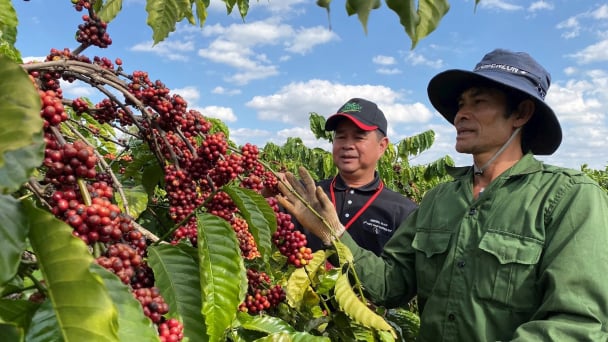
(VAN) Businesses emphasize fairness and equality when integrating social factors into their sustainable development strategies.
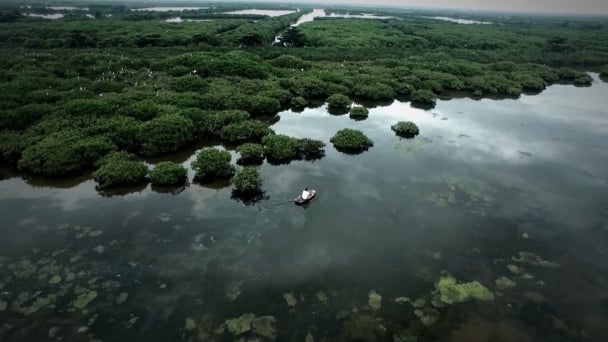
(VAN) French organizations and enterprises propose that Thai Binh province provide potential and long-term cooperation contents related to climate change response and green industrial development.
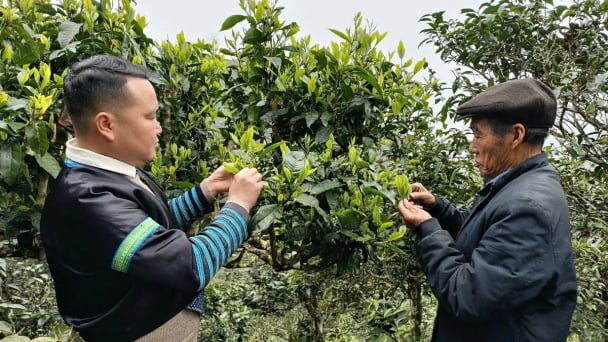
(VAN) Shan Tuyet tea is considered a 'heavenly treasure'. The H'mong people allow the tea to grow naturally, adhering to organic production principles, with the aim of exporting the product.
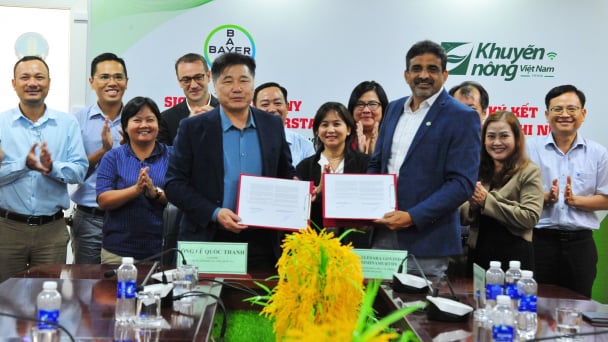
(VAN) Bayer Vietnam and the National Agricultural Extension Center have signed a partnership agreement to expand the development of effective and safe farming models for rice, durian, and coffee.
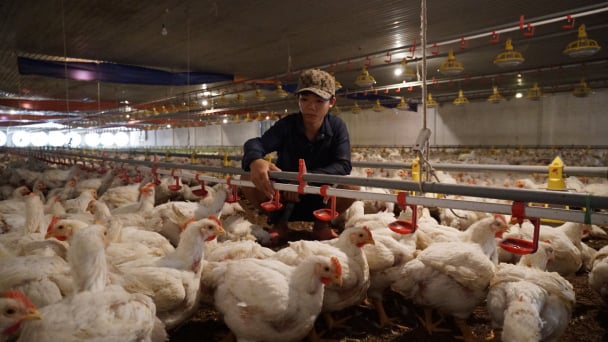
(VAN) Tay Ninh province possesses all the favorable conditions, from natural advantages to geographic location and social harmony, to drive economic development, particularly in attracting investment and advancing modern livestock farming.
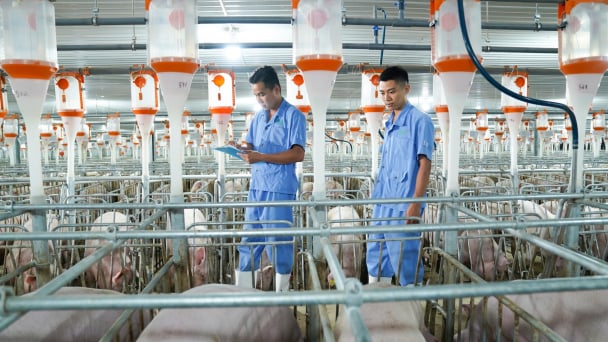
(VAN) Notably, every link in BAF's entire closed livestock value chain Feed - Farm - Food has received international certification.
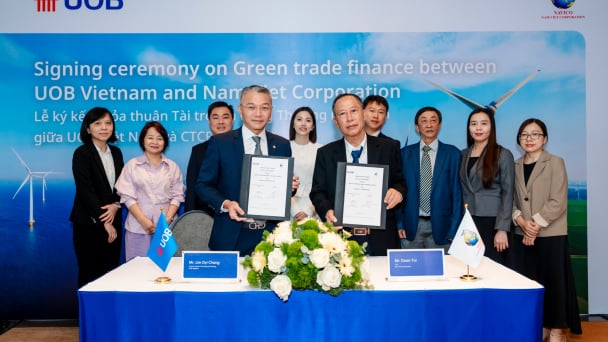
(VAN) UOB Vietnam has recently signed a green credit agreement with NAVICO to develop sustainable aquaculture that meets international standards.